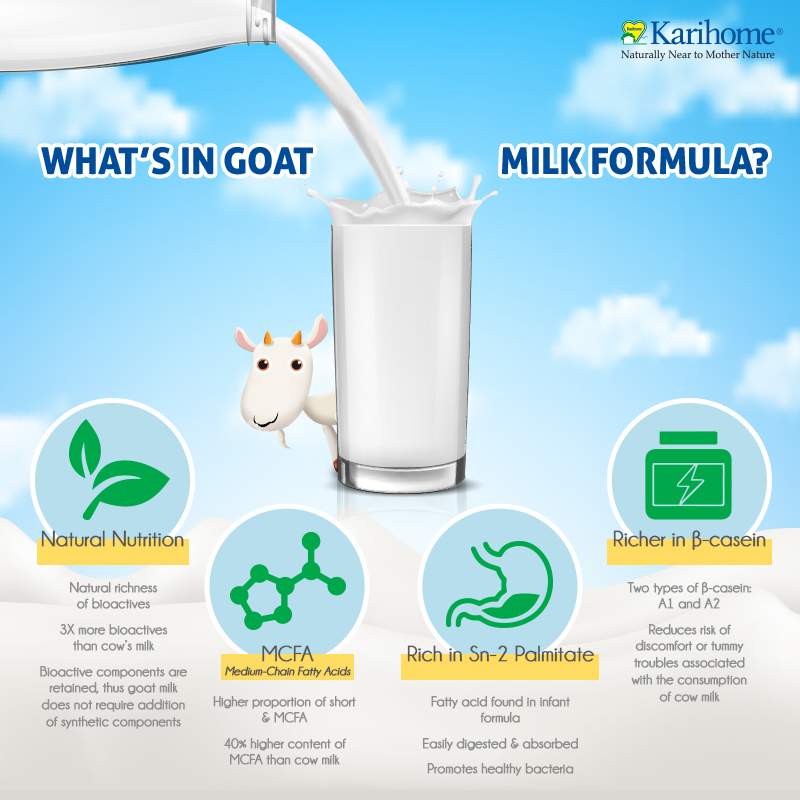

The World Health Organization recommends exclusive breastfeeding for the first 6 months. Thereafter, infants should receive complementary foods with continued breastfeeding up to 2 years of age or beyond.1
When breastfeeding is not possible, infant formula milk becomes an essential alternative to support their growth. Goat milk is growing to become a preferred choice amongst parents when it comes to dairy-based infant formula, as it is easily digestible and less allergenic than cow milk.
What’s In Goat Milk?

Natural Nutrition
Among the many valuable properties of goat milk is the natural richness of bioactives – essential nutrients that are associated with impressive benefits for infant growth and development. Goat milk contains three times more bio-actives than cow milk, reducing the need to add synthetic supplementation.
Goat milk is also rich in free amino acids which are important for the development of strong bones and iron absorption. A particular amino acid, Taurine, is especially rich in goat milk, amounting to 20 times more than that of cow milk.2
Medium-Chain Fatty Acids (MCFA)
Goat milk has a higher proportion of short and medium-chain fatty acids that are absorbed more rapidly than longer-chain fatty acids found in cow milk. These shorter chains form looser and more porous curds, allowing digestive enzymes easier access to the milk proteins. Some studies show that goat milk has up to 40% higher content of medium-chain fatty acids than cow milk.3
Rich in Sn-2 Palmitate
Sn-2 palmitate (Sn-2 PA) is a fatty acid found in infant formula that mimics the composition and structure of human milk fat, and is produced by an enzymatic reaction on vegetable oils. Goat milk infant formulas like Karihome is rich in Sn-2 PA that are easily digested and prevents calcium soaps formation and hard stools, while promoting more healthy bacteria in the gut.
Richer in β-casein
There are two types of β-casein in milk protein: A1 and A2. The intolerance to lactose is often caused by the presence of allergenic A1 β-casein, producing β-casomorphin-7 (BCM-7) during the process of milk digestion. Goat milk exists mainly as the easily digestible A2 β-casein, reducing the risk of discomfort or tummy troubles associated with the consumption of other milks. 4
Ask The Expert: Goat Milk Formula vs. Cow Milk Formula
With over 30 years of experience in lactation consultancy, Dr Wong shares her thoughts on which milk is best for your child.
Clinically Proven to Provide Growth & Nutritional Outcomes in Infants
Protein Profile
Goat milk has a much lower level of ∝s1-casein than cow milk, making it easily digestible. With lower casein levels, goat milk curds (coagulation of milk) are softer and can be broken down more easily during the digestion process. The casein micelles in goat milk are also 40% larger than those from cow milk, creating more porous curds for the digestive enzymes to aid in more efficient digestion of goat milk protein.3
Infant Stool Characteristics
Studies have evidenced that the frequency of bowel motions of infants in the goat milk-fed infants are similar to that of infants in the breast milk-fed group. The protein profile of goat milk, combined with the richness of A2 β-casein, makes it easily digestible for healthier bowel movements.5
Weight, Length & Head Circumference No Different From Cow Milk-Fed Infants
Clinical studies have proven that goat milk formula provides the same growth and nutritional adequacies as the standard whey-based cow milk formula. The study recorded no difference in the weight, length and head circumference in goat milk-fed infants as compared to cow-milk fed infants.6
From Farm to Table
Powdered goat milk formula is the preferred choice for toddlers and children as contains natural ingredients like MCFA, Sn2-PA and vitamins (A, D, E, K). Karihome manufactures its infant formula with 100% whole goat milk, supplied from 72 dedicated farms around New Zealand. To preserve its natural nutrients and benefits, fresh goat milk is spray-dried at a low temperature to reduce damage to nutrients.
All Karihome formulas are made from the highest quality of goat milk in New Zealand and processed in an ISO 9001 certified factory, where stringent quality checks are made from the collection of milk on-farm to manufacturing and packaging to offer nutritionally complete and safe products for infants and toddlers.
The Naturally Nutritious Choice for Children of All Ages
Goat milk is the preferred choice for infant formula and a great source of nutrition to meet the nutritional needs of growing toddlers and young children. Karihome provides goat milk formulas that have been specially fortified with added nutrients to meet the nutritional needs of each age group.
Karihome Growing-Up Formula (for kids aged 1-3)
900g tin ($53.40)
The natural goodness of Karihome Growing-Up Formula helps to meet the nutritional needs of active toddlers aged 1 to 3 years old.
Karihome Pre-School Formula (for kids aged 3-7)
900g tin ($53.40)
A natural progression from Karihome Growing-Up Formula, with fortified blends of nutrients to meet the nutritional needs of this age group.
Karihome Whole Goat Milk Formula (for kids above 7 years old and adults)
500g tin ($23.00)
This formula is produced from fresh goat milk, from which only water has been removed. The goat milk powder can be reconstituted in water to produce a wholesome and nutritious drink that provides the unique nutritional benefits of goat milk.
Click here for FREE samples: http://mail.karihome.com.sg/req-sample.html?utm_source=facebook&utm_medium=fbad&utm_campaign=samrequest
References:
1http://www.who.int/topics/breastfeeding/en/
2https://www.researchgate.net/publication/261323305_Taurine_-_valuable_component_of_goat_milk
3http://www.academicfoodjournal.com/archive/2015/issue1/RevArticlePages56-60.BHUlusoy.pdf
4https://www.ncbi.nlm.nih.gov/pmc/articles/PMC5932946/
5https://www.ncbi.nlm.nih.gov/pmc/articles/PMC3180681/
Copyrighted Pregnancy & Baby by Mummys Market 2019


